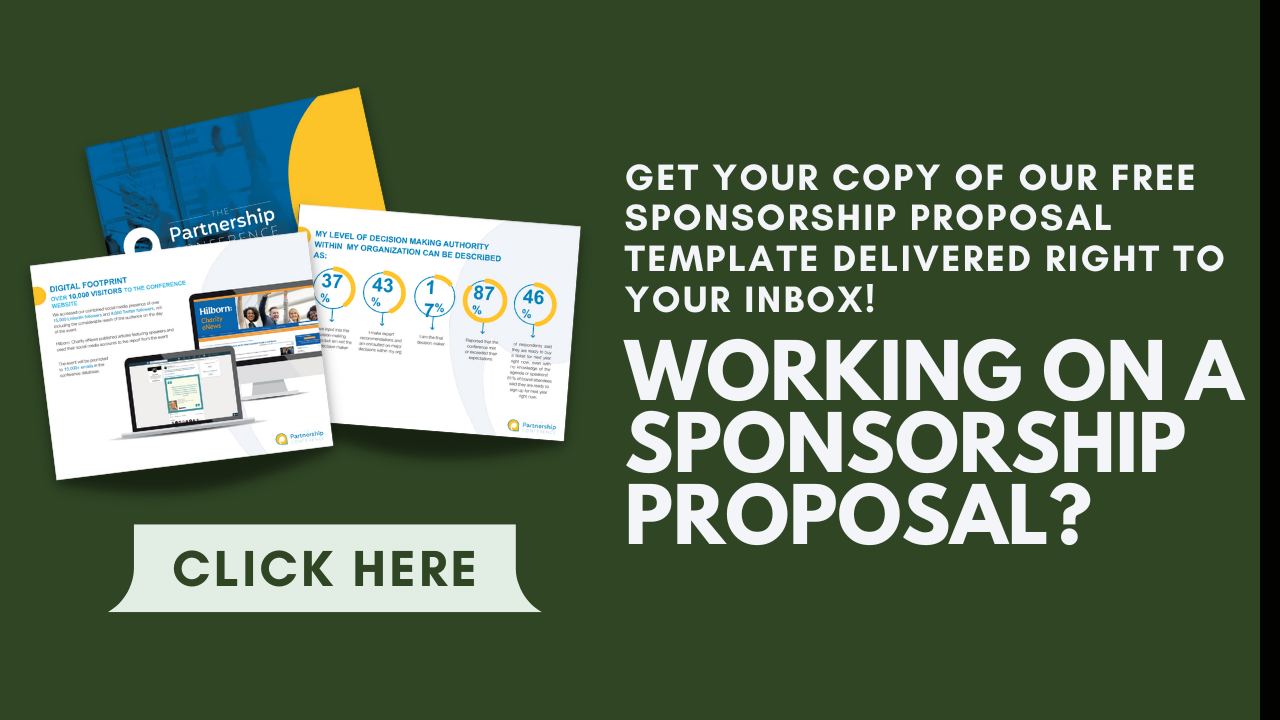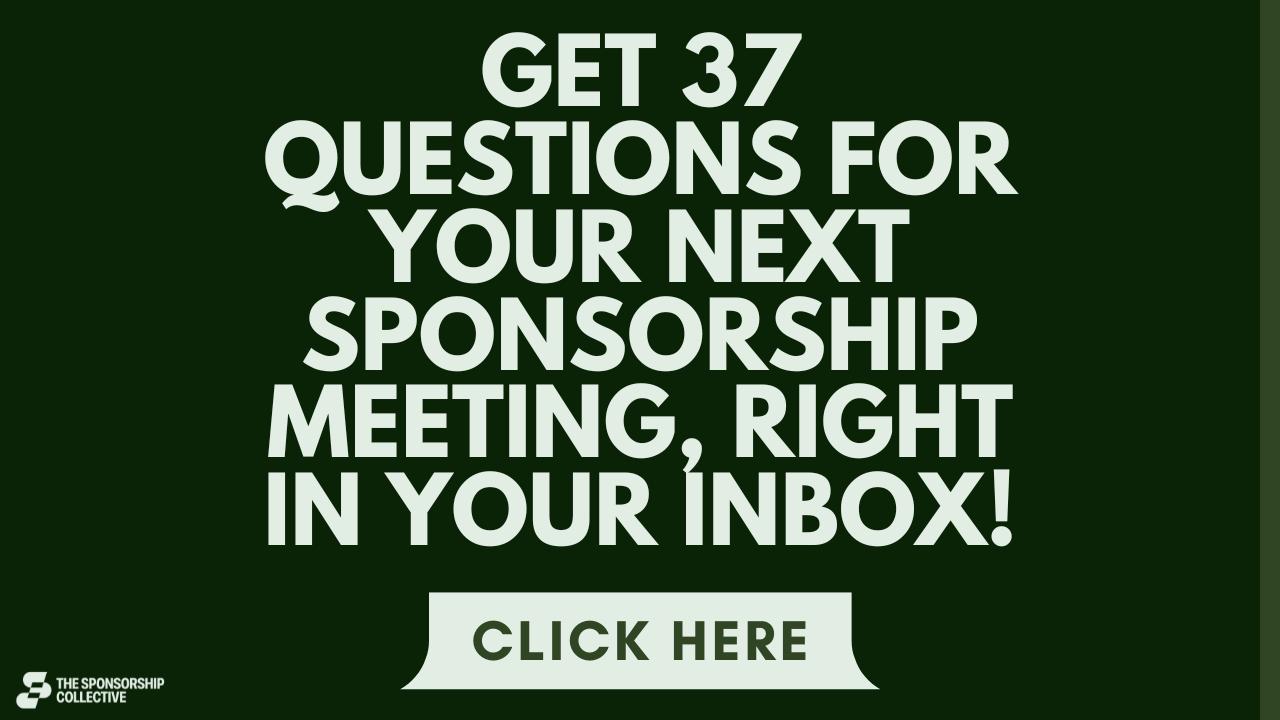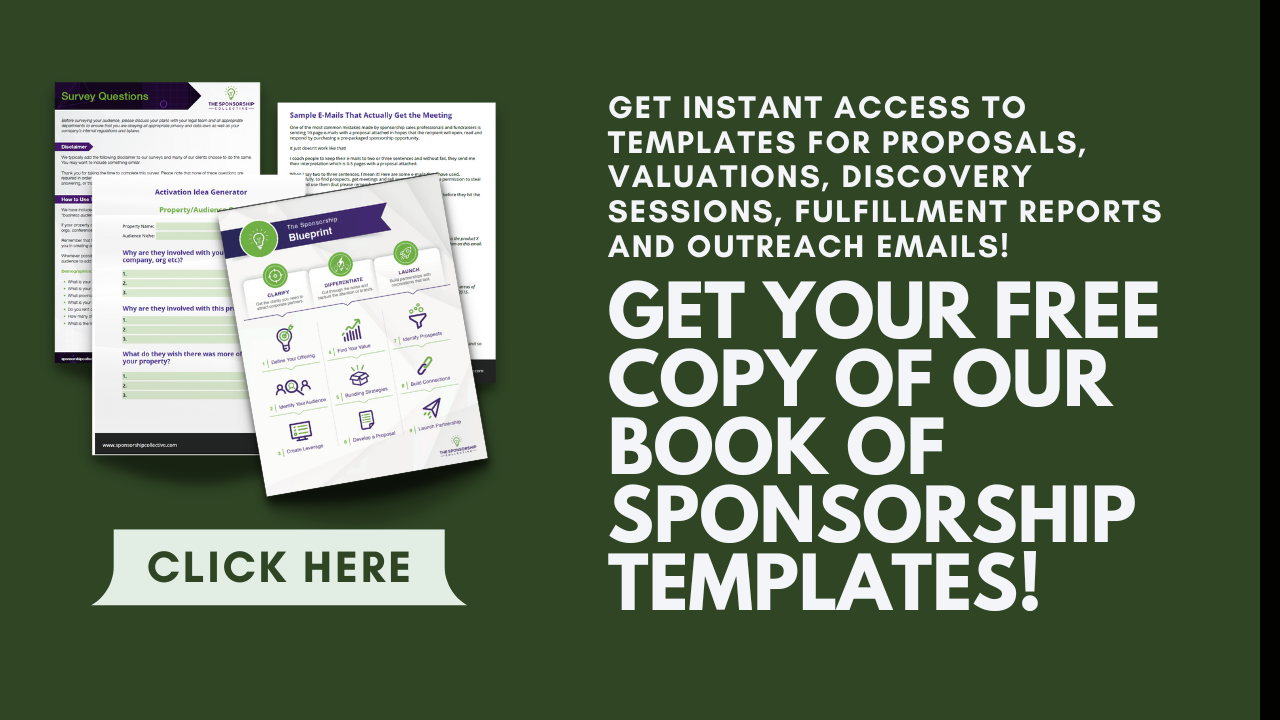Once you’ve identified your sponsorship prospects, your next goal is to set up a discovery session.
This first meeting doesn’t always take place in person, especially anymore. You can have the discovery session on the phone or through Facetime, Zoom, or any other popular video-chatting platform.
After you break the ice with that well-timed and well-practiced joke, it’s time to talk business. The following eleven questions will help you pinpoint whether your prospect could be a viable partner.
Who Is Your Target Audience?
The first question pertains to your prospect’s target audience.
As a note, if you’re not already crystal-clear on your own audience, then this question is as good as useless.
The whole point in asking about the prospect’s target audience is to see if any of your audience segments match. You can’t do that without having priorly segmented your audience.
You know me, I recommend niching your audience down as much as you can.
Think of your audience as an ingredient that you’re putting through a strainer. If the sieve holes are large, that’s a broad audience segment. By using increasingly smaller strainers, you get very fine particles, which are akin to your segmented, niched-down audience.
This post succinctly showcases the nature of questions you have to ask your audience in a survey to create those niches. Check it out if you missed it!
If you’ve already segmented your audience a time or two before, I recommend that your audience data be six months or newer. If it’s been longer than that, survey your audience again. A lot can change in six months!
Take notes as your sponsorship prospect explains their various audience segments to you. Make sure you’re listening rather than thinking of how you’ll respond.
You might not know quite yet where–if anywhere–your audience fits into your prospect’s target audience, and that’s okay. After the meeting, you can always go back to the office and compare data.
That said, if you’re aware of an obvious match between the sponsor’s target audience and your audience, make sure you say something during the meeting!
Not to sound like a broken record here (although I may), but your most valuable asset in any sponsorship program is your audience. Sponsors love to hear about alignments between your customers/attendees/delegates and their target audience.
How Do You Normally Engage in Sponsorship?
This may be your first rodeo, so to speak, but the prospect likely has a lot of sponsorship experience under their belt. Perhaps they’ve even worked with companies sized like yours or in the same industry.
If so, that’s great, but that kind of ultra-tailored experience isn’t necessary. It’s just nice to have.
As the prospect explains their sponsorship process, compare it to yours if you’ve had a sponsorship program in the past. If not, then think about how you would go about sponsorship.
Does the prospect’s process match yours? Or is it close enough?
Sponsorship can mean many things depending on the working partnership. To some, promotions matter most, and to other sponsorship seekers, it’s all about the Benjamins. What a sponsor wants out of the deal is important too.
If there’s very little alignment in how you define sponsorship and how the prospect defines it, then you two could butt heads at every turn. This will not make for a very harmonious working relationship, which reduces your chances of seeking sponsorship renewal.
What Does Your Target Market Value?
Psychographic questions are among the most important in an audience survey, as that’s how you tease out your audience’s interests, brand loyalty, and motivations.
You need to dig a little into psychographics with your prospect’s target audience as well.
What kind of brands does their audience read, drive, sleep, eat, drink, work, play, and use? What events do they attend? What’s their preferred airline? Which bank do they trust to safeguard their money?
This information indicates what the prospect’s target audience finds the most valuable.
For example, if most of the prospect’s target audience banks with JPMorgan-Chase, this tells you the audience values variety since JPMorgan offers many types of credit cards and loans.
You can also glean that your prospect’s target audience cares about traditionalism and maybe following the pack, too. After all, JPMorgan Chase is the biggest bank in the United States.
Knowing what the prospect’s target audience values is infinitely useful to you as a sponsorship seeker. You can use this information to inform your activation ideas and even the assets you sell to the sponsor.
What Can You Tell Me About Your Sales Goals for the Coming Year?
A rookie mistake that first-time sponsorship seekers tend to make a lot is assuming their sponsors are walking ATMs. They aren’t. The sponsor company is comprised of real people with real lives like you and me.
Their company has financial goals to meet per month or per quarter. Depending on how your prospect answers the question of what their company’s sales goals are for the year ahead, you can get a better idea of what the prospect can offer you financially.
Maybe the company is trying to downsize, which is bad news for you. Perhaps they’re trying to break even this year, which also isn’t very promising.
Even if the prospect’s projected sales goals for the year seem positive, that doesn’t always mean the company can allocate funds towards your sponsorship goals. It’s not the sole decision of the company representative you’re talking to unless they happen to own the company.
The rep might agree to sponsor you, but if someone overhead them nixes the idea, then that’s it, there’s nothing you can do right now.
I never recommend pestering a prospect about sponsorship. If it’s not to be right now, then so be it.
Don’t torch the bridge either, though. Maintain friendly contact once or twice per year and you never know, something could work out another time.
What Would You Consider to Be the Most Important Elements of a Sponsorship Package?
When it comes to putting together a sponsorship package–which includes your assets menu–sponsorship seekers can make some critical mistakes. This is certainly a common area to get tripped up, as the sponsorship package is a tricky part of the sponsorship proposal.
Sometimes, sponsorship seekers create what they assume is a really good asset, and they aren’t willing to budge on its price even though the asset isn’t that valuable.
In other instances, the way the assets are categorized is all wrong, especially if you’re still beating the dead horse that is gold, silver, bronze sponsorship tiers.
The best sponsorship packages are those that are customized with the sponsor. You’re asking for their involvement and their feedback. More so than just asking, you implement the feedback they offer to make your sponsorship package even better.
What Is Your Sponsorship Budget?
Depending on who you’re talking to on the totem pole, your prospect might not have an answer to this question right away, so be aware of that.
However, you should follow up on this point later, as you must know what their budget looks like. It’s unwise for you to proceed without this information, as it’s impossible to determine if this sponsor can provide the funding you need (assuming you’re pursuing a cash sponsor) and to what degree.
Even if you get a ballpark number that’s hammered down later, you can work with that.
Unfortunately, if a prospect’s budget doesn’t align with your sponsorship goals, you should go your separate ways. However, keep up with them from time to time, as you never know if their budget could increase later.
Can You Tell Me About Your Latest Marketing and Sales Campaign? What Went Right? What Went Wrong?
The goal of creating assets and activations for a sponsor is to assist them in their sales and marketing goals. You can’t do that without a behind-the-scenes glimpse into what they’ve tried and how well it’s played out.
Go back a campaign or two and review the data. Did the sponsor advertise to too broad a market? Was their messaging not personalized? Did they stray from their brand message?
You don’t have to sleuth out the answers yourself. You can ask the sponsor to walk you through the campaign and explain its shortcomings.
This can feel kind of awkward to discuss the first time around, but don’t only focus on the sponsor’s failures. You also want to learn about a few of their successful campaigns.
Why? You can use the elements they got right as impetus for creating activations.
How Do You Measure the Success of a Sponsorship?
Your definition of what constitutes successful sponsorship versus a prospect’s can vary. It’s important that you’re both on the same page early before you begin working together. This way, you don’t have to butt heads about matters later.
When a sponsor tells you how they perceive sponsorship success, those are the rules you should play by, even if they’re disparate from other sponsorship relationships you’ve had. Each sponsor deserves to be treated as an individual, after all.
I would recommend asking about specific metrics the prospect measures and how important each one is to them. Depending on their goals, they may weigh certain KPIs more heavily than others, which can again be different than what you’re used to when working with other sponsors.
Can You Tell Me About Your Most Successful Sponsor? What About Your Least Successful?
A great follow-up question after learning how a prospect measures sponsorship success is to ask about specific working relationships. They don’t have to name names, but your prospect should be willing to volunteer information about the sponsorship partner they believe has been the most successful.
What traits did the company possess? What did they do right and to what degree? Now, internally ask yourself if you could do the same. The point of learning about a past successful sponsorship isn’t to copy it, but to get an idea of what the sponsor views as excellent service.
Likewise, you will want to hear about the sponsorship opportunity that went the poorest and why. This gives you a list of mistakes to avoid.
Here Is More Information on My Audience. Do You Normally Engage with Them? If So, How?
The sponsorship won’t go very far without audience alignment. Your audience is the most valuable asset you can present to a prospect, but the prospect ultimately determines their value.
If your audience and the sponsor’s target market share nothing in common, your audience won’t be very valuable to them despite the fact that another sponsor might find your audience high-value.
When presenting audience data to a sponsorship prospect, it should be as filtered down as possible. You should have niched your audience data into specific groups. That makes it far easier for a sponsor to answer questions about whether they usually engage with your audience segments and how.
When Can We Set Up Another Meeting?
I saved this one for last because it’s a biggie. I’m the creator and follower of the acronym BAMFAM, which means to book a meeting from a meeting. I teach this to my clients to keep the sponsorship momentum going.
Trust me, if you leave it to the sponsor to get back to you about another meeting, it might never happen. They might really like you and feel keen on working together, but if they get busy, or another priority arises, you could get forgotten about.
Asking your prospect outright about when you can set up another meeting keeps the ball rolling. Make sure you ask this question during every subsequent meeting you have with the prospect!
FAQs
What Should I Provide in Return for Sponsorship?
That depends on your prospect’s goals, which can vary wildly. Sponsors rarely only want brand recognition but also more leads, improved website traffic, more social media followers, a more populated email list, greater conversions, and more sales.
What Does ROI Mean in Sponsorship?
ROI, or return on investment, doesn’t mean anything special in sponsorship. A sponsor that invests in your services—such as assets and activations—expects you to deliver and achieve the goals you two had discussed prior. They should earn enough profit that working with you is justifiable.
How Do I Prepare for a Sponsorship Interview?
Research the prospect thoroughly, reading their website, LinkedIn, news, and press clippings. Think of an icebreaker to start the conversation. If having the interview in person, research where you’ll meet and map it out. Write out the questions you want to ask.
What Are Deliverables to Sponsors?
Deliverables refer to the services you promise contractually to the sponsor. They’re assets and activations primarily, but any service designed to further the sponsor’s goal(s) constitutes a deliverable.
When Should You Have the Discovery Session?
The right time for a discovery session is after you prospect for sponsors but before pitching to them. The discovery meeting tells you whether your goals and audience align with a sponsor’s, which can help you decide how to proceed.
Conclusion
When meeting with a sponsorship prospect for a discovery session, you get one chance to ask the right questions. The 11 questions I outlined today focus on pertinent areas such as the sponsor’s target audience, their company’s sales goals, and what the prospect looks for in a comprehensive sponsorship package.
Asking these questions does not always guarantee a sponsorship arrangement. That’s not the point. You’re merely getting the important questions out of the way now to see if you can help the sponsor.
That’s much better than agreeing to a deal, putting it in writing and making it legal, and then finding out too late that you can’t meet the objectives the sponsor requires.
Go into a discovery session with open ears, and don’t make it too much about money. Good luck!
- About the Author
- Latest Posts
Chris Baylis is the Founder and Editor-in-Chief of The Sponsorship Collective.
After spending several years in the field as a sponsorship professional and consultant, Chris now spends his time working with clients to help them understand their audiences, build activations that sponsors want, apply market values to their assets and build strategies that drive sales.
Read More about Chris Baylis




